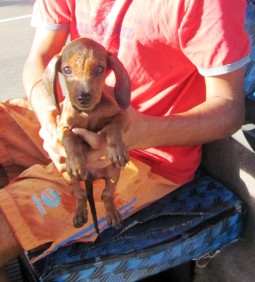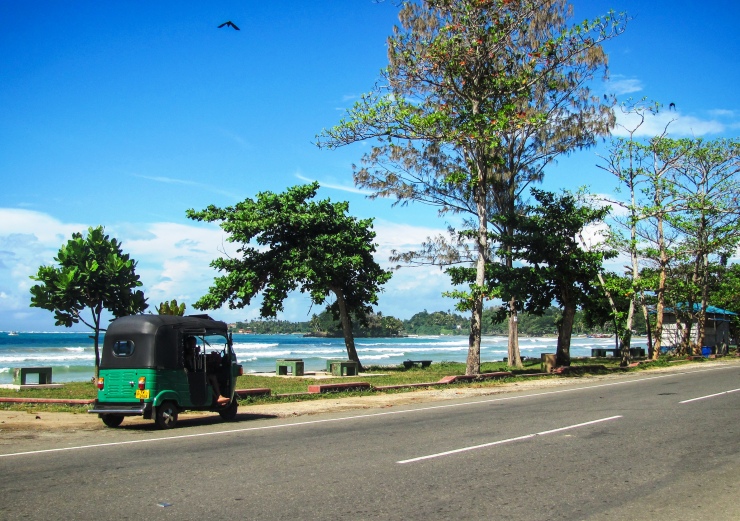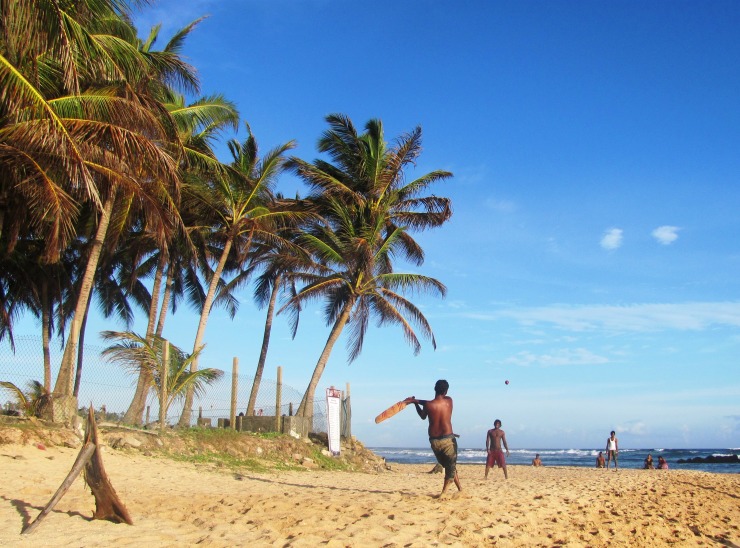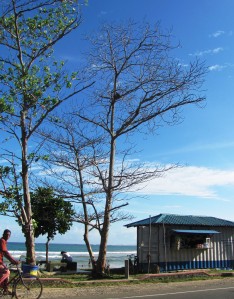“Please wait here, okay? I’ll come back in ten minutes.”

It’s a hot day and we have already waited thirty minutes outside our guest house, so we have no choice but to agree. We are also a little taken with the tuktuk driver’s disarming request, and no less bemused to see wrapped in his left arm a tiny dachshund puppy. He’s wet and shivering, and we learn that our tuktuk-driver-to-be has just given him a bath (at the ocean?) and needs to take him home where there are dry towels and puppy food. They disappear around the bend going towards Weligama’s town centre, and we hop down from the pavement to the stretch of beach for a stroll, keeping an eye out for Mirissa-bound tuktuks, with or without cute animals on board.
Another thirty minutes later we see the green-and-black three-wheeler turn onto the main road, the driver inside waving and all smiles to find that we’ve still had no luck.
“I’m not a tuktuk driver,” he tells us as we finally head to Mirissa for the evening. As my partner and I exchange suspicious side-glances, he gives us his name and an explanation. The tuktuk belongs to his parents, who live on a small farm in Weligama. When they were thinking of getting a car, a low-maintenance runabout made more sense for a town as little as theirs, and a tuktuk was purchased instead. Nishantha* is in town visiting and uses the rickshaw to run errands for his family, to go to his friends’ houses, and as it turns out this afternoon, to offer rides to helpless tourists.

July is not high tourist season, and so far we have seen no other foreigner in Weligama. The coconut shop on the beach has not opened once during our stay, and even Nandipal, who I had met when I was here last year, has moved east to Arugam Bay to be the summer manager at a guest house packed with surfing enthusiasts. We are scheduled to go there in two days—Nandipal’s endearing orders.
In Mirissa we expect to see more activity. Despite the hot season, its popular beaches and whale-watching possibilities lure at least some tourists all year round. This is also my partner’s first time in the country, and after spending some days in a decidedly local atmosphere, we want to visit a more well-known haunt. Nishantha is more than willing to take us to the best beaches, and there is no doubt that the beach where he drops us off is splendid, the sand like horseshoes in the ocean, their concave curves facing each other to form a narrow walkway leading you far out in the water. It’s a first time for me too, on this part of the coast, and the scene here is different from last year’s beach, boomboxes and pink and yellow cocktails replaced by local boys playing cricket and doing cartwheels in the water, the air full of their cheery energy. It’s only a few months out of a year that they have the beach to themselves.

Nishantha has joined us on our walk, and picking up on our travel interests he offers to take us to some spots he claims are not known to tourists. We don’t want to offend the setting sun in the middle of its spectacle, so we wait for it to disappear before getting back on the road.
In less than ten minutes we have arrived at another beach, a short walk down an unpaved road from where Nishantha has parked the tuktuk. Under a half-moon sky still streaked with purple, we find a million unbroken shells, and after he tries out my camera and takes some photos of the beach, Nishantha continues to tell us about himself.
Growing up on a farm, he had always appreciated the simplicity of a country life, but his college education had made it necessary for him to move to Colombo, where he now works as an office secretary at the Indian Embassy. He comes to Weligama as often as he can, but his constant interaction with the enterprising city people and the foreigners at the embassy has produced in him longings for a life more exciting than his fishing town allows.
“So you prefer living in Colombo now?” I ask.
He does, although Weligama will always be home. But he doesn’t want to live in Colombo either. It’s true that in the city he can have a more varied life, but perhaps he is always aware that no matter where he is in Sri Lanka, he is still on a small island country that doesn’t feature in most geography books, that recently saw the end of one of the longest civil wars in history. “I want to look for jobs in Australia,” he says in the most practical of tones.
We spend the rest of our trip in Sri Lanka catching up with Nandipal in a busy Arugam Bay, spotting wild cats and crocodiles at Yala National Park, swimming over the gorgeous corals of Trincomalee. Almost every day we hear from Nishantha—he texts us his greetings and makes several calls as well, asking about all the details of our trip and then some. We are a little unsure about what to make of all this excited friendliness. Does he want to keep in touch with us because we’re foreigners and therefore a point of contact for him with the world beyond? We feel awkward that this thought occurs to us—it would be much more ideal if we could be sure that his eagerness for communication was due to the charms of friendship alone, and yet we can’t seem to shake the feeling that it is not the case.

Our last day in Colombo we make preparations for our stay in the next country we’re visiting—the Maldives. It’s made wholly of atolls, and the Hulhumale airport is an island in itself, from where we are ferried to Malé, another island and the capital. The novelty of all these experiences is astonishing, and between that feeling and the rush to get a new phone number to stay in touch with my habitually anxious parents, I dispose of the Sri Lankan sim that contains Nishantha’s contact information.
My partner and I talk of him a few times as we go around another island nation, accumulating new experience after new experience. Eventually our traveller’s exhilaration wins and he slowly drops out of our conversations, waiting perhaps at his embassy office as people come and go with their passports, for a reply to his last unanswered message.
*name changed


I wish i could go there soon, especially Mirissa beach, thanks for sharing great story & photos
LikeLike
A beautiful story with beautiful photos. I like the way you started the the post… really absorbing
LikeLiked by 1 person
I loved Mirissa, from what I gathered it’s not the most crowded of all the beaches and I appreciated that.
How did you like it?
LikeLike
Thanks for your comment! Mirissa is definitely beautiful, and though not as commercialized as Hikkaduwa, I feel during the main tourist season the place does try to exude a kind of pseudo “Caribbean” charm you find in popular beaches across Asia Pacific.
LikeLike
Sounds like a great place! Can’t wait to get to Sri Lanka one day.
LikeLike
Lovely photos, and I agree with Becky above – it’s not a bad place to get stuck 😉
LikeLike
Not a bad place to get stuck 😉 Love the photo of the cute dog – so sweet!
LikeLike